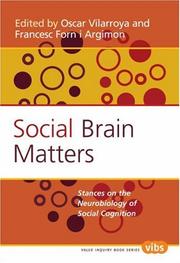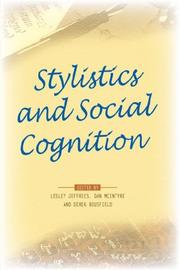| Listing 1 - 7 of 7 |
Sort by
|

ISBN: 9401204497 1435600754 9781435600751 9789401204491 9042022167 9789042022164 9789042022164 Year: 2007 Publisher: Amsterdam New York, NY Rodopi
Abstract | Keywords | Export | Availability | Bookmark
 Loading...
Loading...Choose an application
- Reference Manager
- EndNote
- RefWorks (Direct export to RefWorks)
This book examines philosophical and scientific implications of Neodarwinism relative to recent empirical data. It develops explanations of social behavior and cognition through analysis of mental capabilities and consideration of ethical issues. It includes debate within cognitive science among explanations of social and moral phenomena from philosophy, evolutionary and cognitive psychology, neurobiology, linguistics, and computer science. The series Cognitive Science provides an original corpus of scholarly work that makes explicit the import of cognitive-science research for philosophical analysis. Topics include the nature, structure, and justification of knowledge, cognitive architectures and development, brain-mind theories, and consciousness.
Cognitive neuroscience. --- Cognitive psychology. --- Social perception. --- Cognition, Social --- Interpersonal perception --- Social cognition --- Interpersonal relations --- Perception --- Social cognitive theory --- Psychology, Cognitive --- Cognitive science --- Psychology --- Cognitive neuropsychology --- Neuropsychology

ISBN: 9780415701983 9780203939024 9781135990473 9781135990510 9780415701976 Year: 2007 Publisher: London Routledge
Abstract | Keywords | Export | Availability | Bookmark
 Loading...
Loading...Choose an application
- Reference Manager
- EndNote
- RefWorks (Direct export to RefWorks)
Cognition --- Rational choice theory --- Social choice --- Social perception --- gedrag --- mathematische modellen, toegepast op economie --- speltheorieën --- Cognition, Social --- Interpersonal perception --- Social cognition --- Interpersonal relations --- Perception --- Social cognitive theory --- Choice, Social --- Collective choice --- Public choice --- Choice (Psychology) --- Social psychology --- Welfare economics --- Psychology

ISBN: 9401200645 143561108X 9781435611085 9042023120 9789042023123 9789042023123 9042023120 Year: 2007 Publisher: Amsterdam Rodopi
Abstract | Keywords | Export | Availability | Bookmark
 Loading...
Loading...Choose an application
- Reference Manager
- EndNote
- RefWorks (Direct export to RefWorks)
This volume of articles comprises papers from the 25th annual conference of the Poetics and Linguistics Association (PALA), which was held at the University of Huddersfield, England, in July 2005. The theme of the conference was ‘Stylistics and Social Cognition’, and as usual at a PALA conference, this theme was interpreted very widely by the participants, as the reader of this book will no doubt conclude. At the heart of this volume, there is something of a reaction against the cognitive developments in stylistics, which might be seen as being in danger of privileging the individual interpretation of literature over something more social. The concern is to consider whether there is a more collective approach that could be taken to the meaning of text, and whether recent insights from cognitive stylistics could work with this idea of collectivity to define something we might call ‘commonality’ of meaning in texts. Stylistics and Social Cognition will be of interest to those working in stylistics and other text-analytic fields such as critical discourse analysis and those concerned with notions of interpretation, collective meaning and human communication.
Language and languages --- Rhetoric --- Social perception --- Social perception. --- Speaking --- Authorship --- Expression --- Literary style --- Cognition, Social --- Interpersonal perception --- Social cognition --- Interpersonal relations --- Perception --- Social cognitive theory --- Linguostylistics --- Stylistics --- Style --- Social aspects --- Style. --- Social aspects. --- Cognitive psychology --- Social psychology --- Stilistics

ISBN: 9780805083392 0805083391 Year: 2007 Publisher: New York St. Martin's Griffin
Abstract | Keywords | Export | Availability | Bookmark
 Loading...
Loading...Choose an application
- Reference Manager
- EndNote
- RefWorks (Direct export to RefWorks)
#KVHA:Taalkunde --- #KVHA:Interne communicatie --- #KVHA:Niet-verbale communicatie --- 159.94 --- 316.772.12 --- Expression --- Emotions --- Interpersonal communication --- 152.4 --- #SBIB:309H53 --- Communication --- Interpersonal relations --- Psychology --- Affect (Psychology) --- Affective neuroscience --- Apathy --- Pathognomy --- Feelings --- Human emotions --- Passions --- Eloquence --- Oratory --- Public speaking --- Reading --- Acting --- Delsarte system --- Elocution --- Nonverbal communication --- Rhetoric --- Expressive behavior --- 316.772.12 Sociale psychologie van de taal, van de communicatie en van de interactie. Social cognition--(communicatiesociologie) --- Sociale psychologie van de taal, van de communicatie en van de interactie. Social cognition--(communicatiesociologie) --- 159.94 Expressies. Uitdrukkingen --- Expressies. Uitdrukkingen --- Niet-verbale communicatie --- Expression.

ISBN: 9781841694580 1841694584 9780203837788 9781136872938 9781136872976 9781136872983 9781138006249 Year: 2007 Publisher: New York : Psychology Press,
Abstract | Keywords | Export | Availability | Bookmark
 Loading...
Loading...Choose an application
- Reference Manager
- EndNote
- RefWorks (Direct export to RefWorks)
Social perception. --- Evolutionary psychology --- Perception sociale --- Psychologie évolutionniste --- Social aspects. --- Aspect social --- #KVHB:Evolutionaire psychologie --- #KVHB:Sociale psychologie --- Psychologie évolutionniste --- Social psychology --- Social perception --- Cognition, Social --- Interpersonal perception --- Social cognition --- Interpersonal relations --- Perception --- Social cognitive theory --- Psychology --- Human evolution --- Social aspects

ISBN: 1841690910 1841690902 9781841690919 9781841690902 Year: 2007 Publisher: New York Psychology press
Abstract | Keywords | Export | Availability | Bookmark
 Loading...
Loading...Choose an application
- Reference Manager
- EndNote
- RefWorks (Direct export to RefWorks)
Social comparison. --- Comparaison sociale --- Comparison (Psychology) --- Self-perception --- Social comparison --- Social perception --- Cognition, Social --- Interpersonal perception --- Social cognition --- Interpersonal relations --- Perception --- Social cognitive theory --- Social comparison theory --- Self-evaluation --- Self-concept --- Self image --- Self-understanding --- Self-discrepancy theory --- Attention --- Consciousness --- Knowledge, Theory of --- Psychology

ISBN: 079147951X 1435606477 9781435606470 9780791472170 0791472175 9780791479513 Year: 2007 Publisher: Albany : State University of New York Press,
Abstract | Keywords | Export | Availability | Bookmark
 Loading...
Loading...Choose an application
- Reference Manager
- EndNote
- RefWorks (Direct export to RefWorks)
Drawing from the fields of rhetoric, cultural studies, literature, and folkloristics, Kathleen Glenister Roberts argues that identity and the history of alterity in the West can be understood more clearly through narrative motifs. She provides analyses of these motifs including infanticide, universalism, the Tower of Babel, the warrior Other, the noble savage, entropology, and the trickster. With current intellectual conflict as its subtext, this book posits that identity is always negotiated toward Otherness. Roberts interrogates narrative constructions of Western biases toward non-Western Others, with each chapter addressing a Western historical moment through an exemplary narrative. This process shows that by imagining and objectifying Others, Western cultures were creating their own Selves. In confronting the ethnocentrism of past historical moments, Roberts invites us to recognize it in the present—in a new way. Alterity and Narrative asks that we afford Others the ability to transcend their own ethnocentrism, and therefore avoid well-meaning but naïve calls for "cultural sensitivity."
Difference (Philosophy) in literature. --- Difference (Psychology) --- Identity (Philosophical concept) in literature. --- Identity (Psychology) --- Identity (Philosophical concept) --- Prejudices --- Social perception --- Differential psychology --- Psychology, Differential --- Differentiation (Developmental psychology) --- Psychology --- Identity in literature --- Identity --- Philosophy --- Comparison (Philosophy) --- Resemblance (Philosophy) --- Bias (Psychology) --- Prejudgments --- Prejudice --- Prejudices and antipathies --- Attitude (Psychology) --- Emotions --- Cognition, Social --- Interpersonal perception --- Social cognition --- Interpersonal relations --- Perception --- Social cognitive theory --- History. --- Religious aspects.
| Listing 1 - 7 of 7 |
Sort by
|

 Search
Search Feedback
Feedback About UniCat
About UniCat  Help
Help News
News